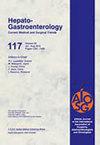内镜射频消融治疗胃化生或不典型增生:一项初步研究。
引用次数: 7
摘要
背景/ aim胃肠化生和不典型增生患者发生胃癌的风险增加。我们测试了使用内镜射频消融治疗胃发育不良和化生的可行性。方法招募组织学证实为轻度胃发育不良或IM的患者。内镜下射频消融术每8周进行一次,最多3次。所有患者均接受内镜随访,直至rfa后12个月。在随访中,主要结果是完全根除不典型增生或IM。次要终点是与RFA相关的不良事件。结果共纳入12例患者。4例患者为低度发育不良,其余8例患者基线时为非发育不良IM。RFA后1年,4例低级别发育不良患者(100%)完全根除了发育不良。所有基线化生患者的胃IM持续存在,但6例(75%)患者IM的严重程度有所改善。内镜下射频消融术是安全的,并发症很少。结论srfa可成功根治胃低度发育不良。然而,胃IM在RFA后持续存在,但大多数患者在随访中有组织学改善的证据。本文章由计算机程序翻译,如有差异,请以英文原文为准。
Treatment of Gastric Metaplasia or Dysplasia by Endoscopic Radiofrequency Ablation: A Pilot Study.
BACKGROUND/AIMS
Patients with gastric intestinal metaplasia and dysplasia are at increased risk of gastric cancer development. We tested the feasibility of using endoscopic radiofrequency ablation for the treatment of dysplasia and metaplasia in the stomach.
METHODOLOGY
Patients who had histologically confirmed low-grade gastric dysplasia or IM were recruited. Endoscopic RFA was performed at 8 week-intervals for a maximum of 3 sessions. All patients were followed up by endoscopy until 12 months post-RFA. The primary outcome was the complete eradication of dysplasia or IM on follow-up. Secondary outcome was adverse events related to RFA.
RESULTS
A total of 12 patients were recruited. Four patients had low-grade dysplasia and the remaining 8 patients had non-dysplastic IM at baseline. At one year after RFA, complete eradication of dysplasia was noted in four patients with low-grade dysplasia (100%). Gastric IM persisted in all patients with baseline metaplasia but the severity of IM improved in 6 (75%) patients. Endoscopic RFA was safe with minimal complications encountered.
CONCLUSIONS
RFA successfully eradicated low-grade dysplasia of the stomach. Gastric IM however persisted after RFA but most patients had evidence of histological improvement on follow up.
求助全文
通过发布文献求助,成功后即可免费获取论文全文。
去求助
来源期刊

Hepato-gastroenterology
医学-外科
自引率
0.00%
发文量
1
审稿时长
1.9 months
期刊介绍:
Hepato-Gastroenterology has been discontinued as of 2015. Extremely limited quantities of back issues in print available for sale.
 求助内容:
求助内容: 应助结果提醒方式:
应助结果提醒方式:


